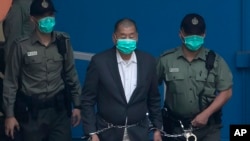Lawyers for Hong Kong billionaire media mogul and pro-democracy activist Jimmy Lai are asking the United Nations to investigate the criminal charges pending against him, arguing that the allegations are nothing but “legal harassment” and amount to the "weaponization of the law."
It is not clear how the United Nations Human Rights Office may respond to the request.
Lai, 74, has been charged under Hong Kong's national security law and is serving 20 months in prison. He faces four criminal prosecutions related to his attendance at pro-democracy protests in Hong Kong between 2019 and 2020. The charges include taking part in an unlawful assembly and violating the territory’s repressive national security law that authorities have used to target other democratic activists.
Caoilfhionn Gallagher, a lawyer at Doughty Street Chambers, leads the international legal team for Lai and said the urgent appeal was filed April 8.
In a statement released by the legal team, Gallagher said the appeal "details how Hong Kong and Chinese authorities are weaponizing the law against" Lai.
According to the statement, “Lai faces the risk of spending the rest of his life in prison simply for speaking out, and for seeking to defend freedom of the press, democracy and the rule of law in Hong Kong."
The charges against Lai “constitute prosecutorial, judicial and legal harassment of Lai, because of his advocacy of democracy and the rights to protest and freedom of expression in Hong Kong SAR, and his work as founder and editor of Apply Daily,” the statement said. The pro-democracy newspaper was owned by Lai but folded last year after 26 years of journalism.
Sebastien Lai, Jimmy Lai’s son, has welcomed the lawyers’ move.
"My dad’s trials are piling up with no end in sight. The CCP [Chinese Communist Party] may have swapped their guns for a gavel. But with patience, a gavel can do as much damage, and make much less noise," he told Radio Free Asia.
The U.N. Human Rights Office declined to comment on the request. “All submissions the Special Rapporteur receives are confidential and she will therefore not be able to confirm or deny whether she received such a submission,” a press officer said in an emailed response to VOA Mandarin.
According to the U.N., these urgent appeals and letters remain confidential for up to 60 days, and then will be made public in reports presented to the Human Rights Council.
When asked about the approach to the U.N., the Hong Kong Security Bureau said that acts and activities endangering national security are serious crimes.
“Law enforcement agencies have taken actions based on evidence and the law, and it has nothing to do with his (Lai) occupation or political stance,” the bureau told VOA Mandarin. “We believe the accusation by Lai’s legal team has no basis in fact.”
Frankie Siu, a lawyer at Hong Kong-based law firm Anthony Rogers Chambers, said the term "legal harassment" refers to the use of the law as a tool to achieve goals beyond the original intent of the legislation.
“Take the charge of ‘traffic obstruction’ as an example," he explained to VOA Mandarin. "It was originally intended to regulate unregistered food vendors, but during the pro-democracy movement in 2019, it was used to detain and charge demonstrators.”
Siu said the appeal from Lai’s legal team is unlikely to affect the charges against the activist but noted that it would help raise attention and create more discussion in the international community to “force the Hong Kong government to better explain the contents of the national security law.”
Since it was implemented in 2020, the measure has remained vague and far-reaching, leaving legal professionals and the public guessing where the red line is.
“The law is dangerously vague and broad: virtually anything could be deemed a threat to “national security” under its provisions, and it can apply to anyone on the planet,” rights group Amnesty International has said.











